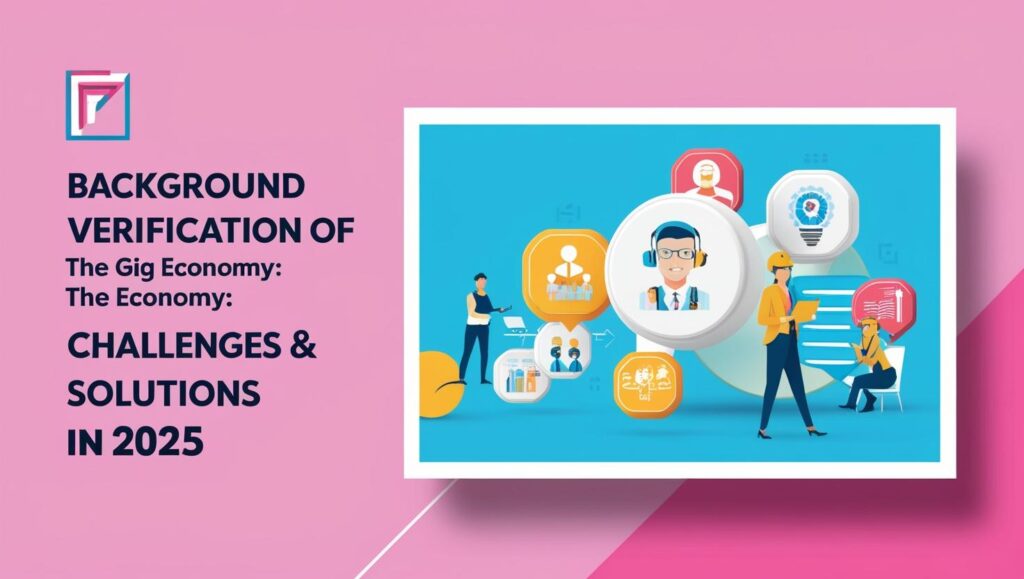The gig economy is changing the workforce of the world by providing flexibility to the workers and cost-effectiveness to the employers. By 2025, it is expected that more than 40% of the global workforce will be gig-based-from freelancing to contract and temporary engagements. The model, however, relies on speed and adaptability, which brings along its unique challenges, especially trust and security. Background verification has become an essential answer to these concerns as a means to ensure safety and reliability for all stakeholders.
The Future of the Gig Economy: 2025 edition
The gig economy is the antithesis of the traditional employment mode; it’s based on short-term engagements. People are mostly onboarded with very minimal screening to fill immediate business needs. Such a quick onboarding, however, leaves companies exposed to numerous risks including fraud, theft, and data breaches.
Why Background Verification is Needed
Many of these worries gig workers face handle sensitive jobs that include receiving clients’ packages, client data, or even work on popular projects. Without proper screening, fraud and malpractice will occur, and businesses will be left to hire anyone with questionable backgrounds. The gig economy lives on trust. And this can only be guaranteed through background verification.

Key Gig Economy Education Background Verification Issues
1. The tradeoff between speed and accuracy
Gig platforms are targeting fast onboarding to catch up with the fast pace of demand; the process often skips the thorough background check, and red flags are often skipped.
2. Managing Global Workforce
The gig economy is truly global; it provides a diverse global workforce. Background verification for workers coming from different countries and having varied legal systems could be a time-consuming process.
3. Lack of Uniformity
Unlike the conventional employment, universal procedures cannot be found across all gig economies for background verification. Some platforms are more concerned with their costs rather than being comprehensive, hence making practices inconsistent.
4. Privacy and Data Protection
Background checks involve gathering and processing personal data. Companies need to stay in accordance with jurisdictions like GDPR and CCPA when carrying out legal activities.
Solution for Effective Background Verification
1. Leverage Technology Speed and Accuracy
Technology is the backbone for modernization in background verification processes.
AI and Machine Learning: Advanced algorithms can process huge data within a few seconds, where human checks will take a few days.
Blockchain Technology: Blockchain allows credentials to be tamper-proofed, so it creates a transparent verification process.
2. Screening based on role
Background check for the type of gig must be made specific to the kind of gig. For instance:
A delivery driver will need to vet all the driving history.
A freelancer will need to vet professional certificates and previous working experiences on projects.
3. Continuous Observation
While it is possible to carry out pre-hiring checks, companies should have ways through which they can monitor the workers to know their conducts while in engagements. This way, the risks may be contained earlier before getting out of hand.
4. Partnering with International Service Suppliers
Since the gig economy has been a global phenomenon, dealing with some such background checking vendors allows country-specific regulations to be followed in addition to authentic data being acquired.
5. Foster Trust through Transparency
Bring about awareness of the need for a background check among the gig workers and how their data is going to be kept confidential. There is always a cause and effect: transparency builds up trust and cooperation.
Gig Platforms Best Practices
Standards be Clear
Establish and clearly communicate consistent background verification standards for all roles.
Scalable Systems
Develop verification systems that can handle large volumes of checks as your platform grows.
Invest in Compliance
Keep up to date on global regulations so that your processes will meet the requirements of the law.
Review Policies Frequently
Constantly review and improve your verification processes to meet the changing challenges.
Background Verification in Risk Mitigation
Background verification can be added to the operations of gig platforms to:
Increase Safety: Background check workers on criminal records, preventing any danger from those workers to the clients or colleagues.
Quality Increase: Confirmation of worker’s credentials and experience helps ascertain the quality of the worker for that job.
Increases reputation: Shown commitment towards safety and trust will attract more clients and quality workers to the platform.
Future of the Gig Economy Verification
Growth of the Gig Economy
This sector is to continue growing during 2025. Technological and lifestyle changes to favor flexible employment opportunities are other growth drivers, but the development must be as fast that the system needs robust verification systems in order to maintain safety and trust.
Growing Trends
Automated Verification Processes
Smarter verification check processes to screen faster with precision through the AI
In-house Solutions: An integrated offering providing end-to-end verification along with recruitment and payroll processing.
Ensure Data Security Focus: Increased protection of employee data to ensure on-going compliance with international privacy law.
Conclusion
With opportunities lie great challenges; the gig economy is a considerable trust and security threat. Background checking is no more of an option, but a major pillar of success within the framework of gig-based platforms. Technology combined with stern compliance standards along with transparency ensures a safe environment for workers as well as their clients.
